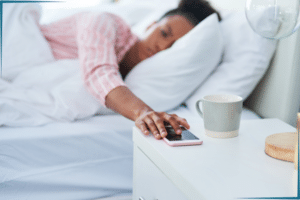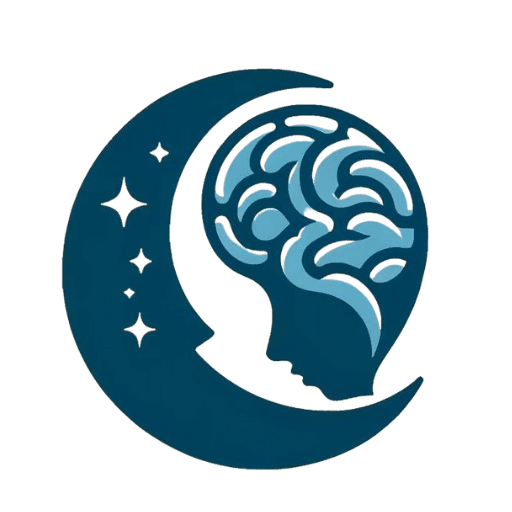We’ve all been there: the alarm rings, and your first instinct is to reach for the snooze button, hoping that an extra 5 or 10 minutes will make getting out of bed easier.
But instead of feeling refreshed, you wake up even more tired and groggy. Why does this happen? And more importantly, how can you wake up feeling genuinely energized?
Let’s dive into the science of sleep to uncover the truth about snoozing and how to break free from this habit for good.
What Happens When You Hit Snooze? (The Science Behind It)
When you hit the snooze button, you may think you’re getting a few more precious minutes of sleep, but here’s what actually happens: your body and brain get confused.
Our sleep follows a cycle, moving through different stages from light to deep sleep and back again.
By hitting snooze, you interrupt this natural rhythm. Instead of completing your cycle, you start a new sleep cycle that you won’t finish.
This disruption leaves you waking up in a lighter sleep stage, causing that groggy, foggy feeling known as sleep inertia.
Sleep inertia is a state of impaired cognitive and sensory-motor performance that can last from a few minutes to over an hour.
When you wake up during this stage, you experience that sluggish, disoriented feeling, making it harder for your brain to fully “wake up” and get into gear for the day ahead.

Why Snoozing is Bad for Your Sleep and Health
Now, let’s talk about the bigger picture—how snoozing can affect your health. When you break your sleep cycle repeatedly, you’re not getting the restorative sleep you need. Fragmented sleep can have long-term effects on your health, including:
- Increased Stress Levels: Inconsistent sleep patterns can elevate cortisol levels, the hormone responsible for stress, making you feel anxious and overwhelmed during the day.
- Lower Cognitive Function: Sleep inertia from hitting the snooze button affects memory, reaction time, and decision-making skills, leaving you less sharp for your daily tasks.
- Disrupted Circadian Rhythm: Frequent snoozing can throw off your circadian rhythm (your body’s internal clock), leading to difficulty falling asleep at night and waking up feeling tired.
Most importantly, snoozing means you didn’t have enough restorative sleep at night, and this could be for many reasons. Understanding these reasons and addressing them is key to improving your sleep quality and feeling refreshed in the morning.
How to Stop Hitting the Snooze Button: Practical Tips
Breaking the snooze habit is not about sheer willpower; it’s about creating an environment and routine that makes it easier to get up. Here are some proven strategies:
-
Set a Consistent Wake-Up Time: Try to wake up at the same time every day, even on weekends. Your body will adjust its internal clock, making it easier to wake up without needing to snooze. Regular wake-up times help reinforce your circadian rhythm, which naturally regulates your sleep-wake cycle.
-
Place Your Alarm Across the Room: If your alarm is right next to your bed, it’s too easy to hit snooze and fall back asleep. Put it across the room so you have to physically get out of bed to turn it off. The movement gets your body going and helps shake off the sleep inertia.
-
Create a Morning Routine You Love: Make waking up more appealing by building a morning routine that energizes you. It could be anything from a quick stretch, dancing to your favorite song, or enjoying a delicious and nutritious breakfast. This will give you something to look forward to and make getting up feel less like a chore.
-
Use a Natural Light Alarm Clock: Light is a natural signal for your brain to wake up. Consider using a sunrise alarm clock that gradually brightens your room to mimic the rising sun, helping to wake you gently and reduce sleep inertia.
-
Limit Blue Light Exposure Before Bed: Your phone, tablet, or computer screen emits blue light that tricks your brain into thinking it’s daytime. Try to avoid screens at least an hour before bed to help your body prepare for restful sleep.
Morning Routine Tips to Feel Energized Without Snoozing
If you’re tired of feeling tired every morning, here are a few more ideas to help you start your day feeling fresh and energized:
-
Expose Yourself to Sunlight Early: Natural light in the morning helps reset your circadian rhythm. Spend a few minutes outside or near a bright window to signal your body that it’s time to be awake and alert.
-
Stay Hydrated: Drink a glass of water as soon as you wake up. Your body becomes dehydrated overnight, and a glass of water can kickstart your metabolism and help you feel more awake.
-
Incorporate Gentle Movement: A few minutes of stretching or a light workout can increase blood flow and oxygen to your brain, helping you feel more alert.
-
Have a Healthy Breakfast: Fueling your body with nutritious foods can keep your energy levels steady throughout the day. Opt for a balanced breakfast with protein, healthy fats, and whole grains.
Conclusion
Imagine waking up feeling energized and ready to conquer the day instead of dragging yourself out of bed. It sounds great, right?
The key to achieving this is understanding that those extra minutes of snoozing aren’t helping you; they’re actually holding you back.
By establishing a consistent wake-up time, creating a motivating morning routine, and embracing healthy sleep habits, you can break free from the snooze cycle and start waking up feeling refreshed.
I’m Lena, founder of Caring Sleep Solutions. I’m a neuroscientist, Adult & Child Sleep Coach, and someone who has battled insomnia myself. I understand the frustration of sleepless nights and the impact they have on your daily life. Follow me on Instagram for science-backed tips and practical insights to help you achieve better sleep and feel more energized.
If you’re struggling with falling asleep, staying asleep, or waking up feeling rested, check out my 1:1 coaching options. Together, we can uncover the causes of your sleep challenges and create a personalized, holistic plan to help you enjoy the restorative sleep you deserve—because I’ve been there too, and I know how much it matters!

